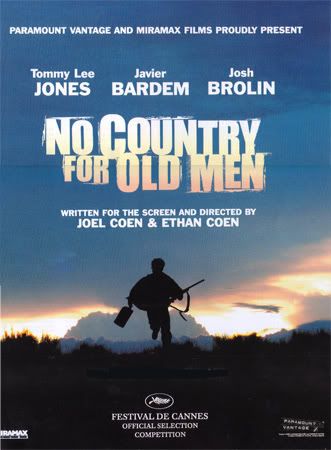No Country For Old Men (Joel Coen & Ethan Coen, 2007)
 There is no film, at least right now, that is getting more best of and awards buzz than No Country For Old Men (with the exception of possibly Juno, on which I'll discuss my feelings soon). At the earliest show in a Saturday afternoon, the weekend it opened in Milwaukee, the huge auditorium I saw it in was 3/4 of the way full, and with a refreshingly diverse crowd (not just old white people, as it usually is at this patricular theater). All the buzz had me expecting the best movie of the year, and while I wasn't disappointed, I was not completely bowled over, either. It's a very good movie with some great performances, but it's not perfect. Javier Bardem, however, is perfect as Anton Chigurh, the cold-blooded killer and thief who my family decided was one of the worst killers onscreen ever. But aside from all the killing he does - and there is a lot - he is also one of the only men in the film with an actual set of values, ironically enough. He does what he says, and says what he does. He's not a killer who traps you through lies and conniving; he is straight-up and brutal. That's terrifying. I hope this role finally brings Bardem the breakout success he so deserves in this country, as well as an Oscar for the finest acting I've seen all year. The rest of the cast is certainly solid, with Josh Brolin (he's having one hell of a year) as Llewellyn, the man who unfortunately finds Anton's briefcase full of money, Tommy Lee Jones as Sherriff Bell, who tries to protect Llewellyn, but is always one step behind, and especially Kelly MacDonald as Carla, Llewellyn's wife who is smart-mouthed but deeply caring and affected. My brother contends that Brolin's performance was as perfect as any actor could be in this role, and maybe he's right and I just don't get the character. Llewellyn is a man who finds ten brutally murdered bodies and doesn't panic, keeps calm, and takes a briefcase of money that he knows someone is going to be looking for. He shows no human emotion throughout the story. Cormac McCarthy's novels are all about the new west, so maybe Llewellyn is just a new version of the old west's cowboys, but I couldn't fathom the lack of shock in his character. The photography is absolutely beautiful, with plenty of long, sweeping shots of the Texas deserts. In a lot of ways, the photography and landscapes reminded me of Badlands, only more depressing. The silence in the movie was a great choice, and served the film well. One decision that the Coens made that I was unsure of, but now definitely appreciate, is their decision to omit the one scene that is arguably the most important, anticipated in the story (if you've seen the movie, I'm sure you know what I mean). The big event just happens, with no flashback to explanation. This is how life is; it just happens, there's no warning. Also, sort of related: there are theories floating around IMDB that Sheriff Bell and Anton have a confrontation in the motel room that the Coens also leave out - probably involving a coin toss and Bell getting his freedom. This is what I thought happened, but my brother and father thought that Anton was long gone from the room before Sheriff Bell arrived. So why that shot of Anton hiding? This would make sense in the context of the film, as most of the scenes in that room are deliberately not included. Did Bell somehow get the money? Why else would he be able to retire so suddently after? Thoughts? So while this is a very good movie, I couldn't feel myself emotionally connect to it. Maybe that's the point; life is cruel and harsh and quick. Expect this to get tons of award nominations, and rightfully so. But maybe I was spoiled by the trailer before the film for There Will Be Blood (which gave me shivers). 8/10 Labels: 2007, ethan coen, joel coen |













